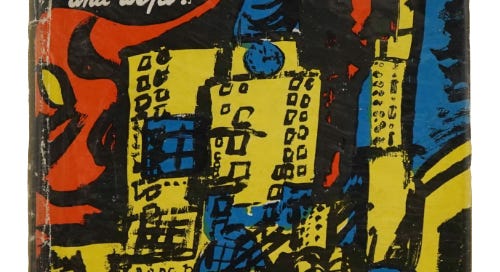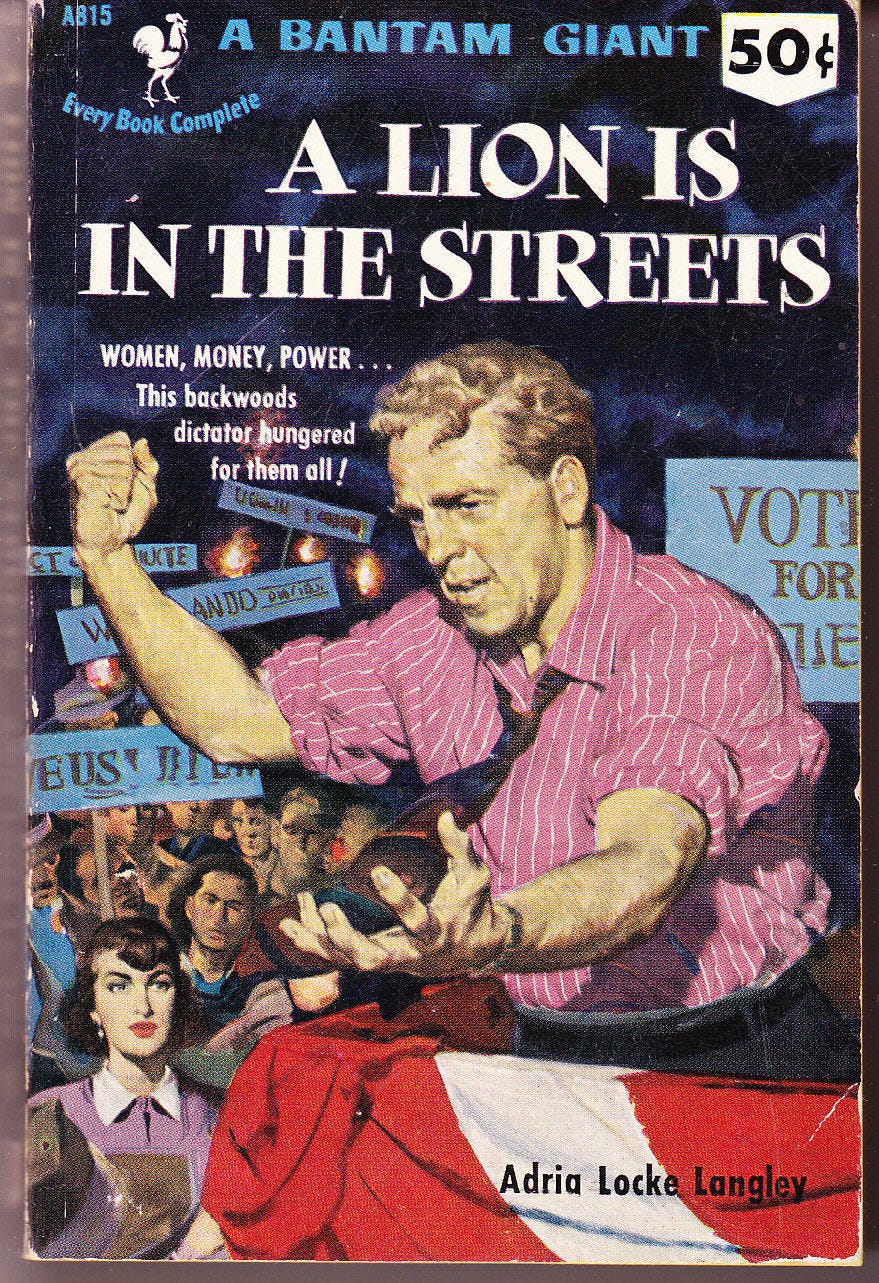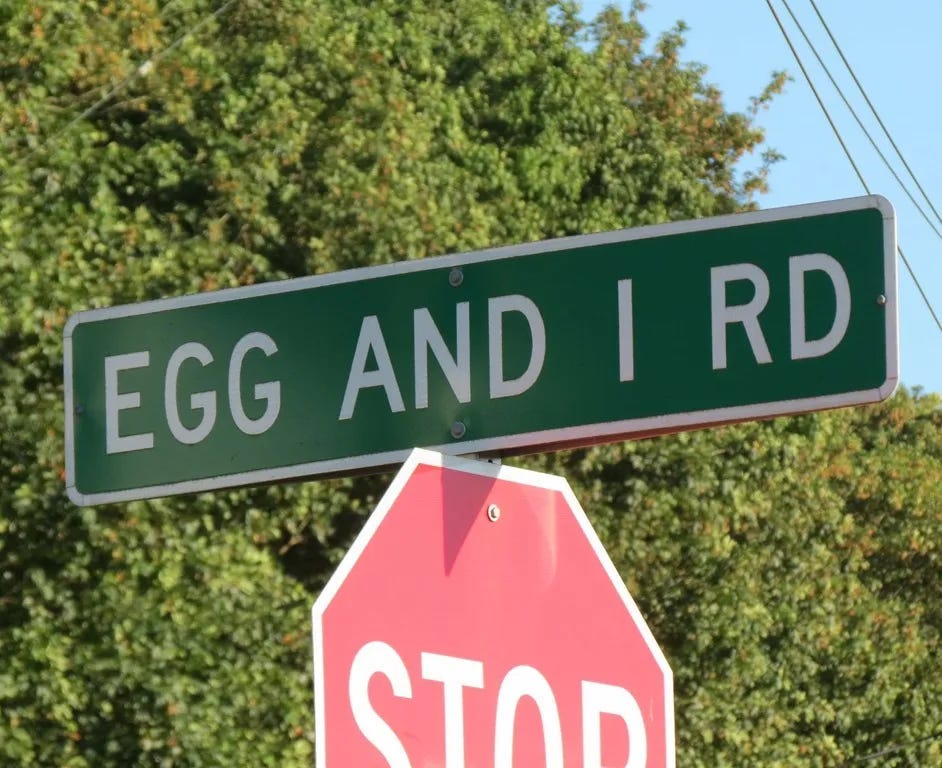Thanks for keeping the Birth Year Project going! Have looked and looked and cannot seem to find who asked for 1945. Lemme know.
Regular post coming in a few days. Be well, mes amis!
About the Birth Year Project:
You supply your birth year, I respond with an overview of what was published that year—the popular/well-known titles first, then some books I'd recommend. If your year's already been done, I'll do an update. To date, we’ve done 21 years altogether, between 1939 and 1989.
[Note: The subheading on the navigation bar listing the years already posted is incomplete, owing to a glitch even Substack’s crack AI function seems unable to rectify. In the near future, I’ll build a new version of the list.]
Extra credit: You read one of the books (ideally one you're unfamiliar with), then tell me what you thought. If we get enough of these, I'll aggregate and post.
SEVEN WELL-KNOWN AND/OR BESTSELLING BOOKS:
The Black Rose, Thomas B. Costain1
A Lion Is in the Streets, Adria Locke Langley2
The Pursuit of Love, Nancy Mitford3
Animal Farm, George Orwell
Cannery Row, John Steinbeck
Brideshead Revisited, Evelyn Waugh
Black Boy (memoir), Richard Wright 4
FIVE REDISCOVERIES:
A Fugue in Time, Rumer Godden5
Loving, Henry Green6
If He Hollers Let Him Go, Chester Himes7
By Grand Central Station I Sat Down and Wept, Elizabeth Smart 8
Saplings, Noel Streatfeild 9
EIGHT INTERNATIONAL WORKS:
The Bridge on the Drina, Ivo Andrić [Austria-Hungary/Yugoslavia/Bosnia- Herzegovina]10
The Death of Virgil , Hermann Broch [Austria]11
The Blood of Others, Simone de Beauvoir [France]12
A Plan for Escape, Adolfo Bioy Casares [Argentina]13
The English Teacher, R. K. Narayan [India]
The Tin Flute [Bonheur d'occasion], Gabrielle Roy [Quebec/Canada]14
The House in the Dark, Tarjei Vesaas [Norway]15
The Egyptian, Mika Waltari [Finland]16
ONE SPECIAL MENTION:
The Egg and I (memoir), Betty MacDonald17
MY LIST:
Animal Farm, The Bridge on the Drina, Cannery Row and The Tartar Steppe are also on my list, leaving only:
Apartment in Athens, Glenway Wescott18
Costain: Historical novel set in 13th century, sold over two million copies its first year, filmed in 1950 (Orson Welles, Tyrone Power). Canadian by birth, Costain also wrote many books of nonfiction. His novel, The Silver Chalice (1952), was also a popular film.
https://en.wikipedia.org/wiki/The_Black_Rose_(novel)
Mitford: One of six daughters of a famous aristocratic family, much in the public eye. Read about them here:
https://en.wikipedia.org/wiki/Mitford_family
Nancy was the writer of the group, remembered for (besides being a Mitford) this novel and Love in a Cold Climate (1949).
Wright (1908-1960): Well-known for his 1940 novel, Native Son, but this memoir was a bestseller and helped establish Wright as a central voice in the mid-century exposure of racial injustice in America. Wright’s politics and the history of this work’s publication are complex subjects—you can read about them here:
https://en.wikipedia.org/wiki/Richard_Wright_(author)
https://en.wikipedia.org/wiki/Black_Boy
Godden (1907-1998): A name I’ve heard off and on for years without knowing a thing about her [see Wiki, below]. Wrote over 60 books, it turns out, adult and children’s. Spent much of her childhood in colonial India/Bangladesh where many of her books are set. For many years ran a school of dance in Calcutta. Her first bestseller was the 1939 novel, Black Narcissus. Converted late in life to Catholicism; awarded an OBE in 1993.
https://en.wikipedia.org/wiki/Rumer_Godden
Green: English, modernist, a cult following among later writers. Known for a string of short novels, this one, and Living (1929), Party Going (1939), Back (1946) Concluding (1948). The books went out of print, but were resurrected in recent years, especially by NYRB Press.
[Green was] one of the 20th century's great unpeggable originals, each of whose novels (each of whose sentences, you could even say) takes off for new and unexpected places." —Edwin Frank, editor of NYRB.
Himes: Mentioned in Reading Project [13]: The Harlem Renaissance and Beyond [see footnote 14].
Smart: I’ll be giving this a shot soon. It’s a prose poem (or novel in verse), based on her tumultuous romance with married poet George Barker. Think you have issues with your mother? Smart’s convinced authorities to prevent Barker from entering Canada to see the child he’d father with Smart (“moral turpitude”), then had the book banned, then burned the copies that had made it through the embargo. And that’s just the start of the story.
https://en.wikipedia.org/wiki/Elizabeth_Smart_(Canadian_author)
Noel Streatfeild: Was a woman—there should be an umlaut over the e in Noel [as in Brontë] . . . and that’s not a typo in her last name.
I first learned of her while prepping the post on Persephone Books. Here’s the rest of that note:
She was a prolific writer of children’s books, which so consumed her writing life that she managed to squeeze out only sixteen adult novels and five nonfiction books. Well, and twelve adult novels under the name Susan Scarlett. Read about her here:
https://en.wikipedia.org/wiki/Noel_Streatfeild
And check out the handsome, user-friendly catalog from Persephone:
https://persephonebooks.flywheelsites.com/catalogue_2024/index.html
Andrić: The bridge itself is the central figure in this work—depicted over centuries, as if by time-lapse recording . . . the same narrative strategy as in, for instance, Daniel Mason’s North Woods, the camera staying with the place, the people coming and going. Gives a sense of the region’s complex history. Andrić was an important figure—politically active, a Nobel Laureate in Literature (1961).
When I was teaching, I used to quote a line from this novel, exemplifying how a deadpan tone can give the reader chills:
On sunny days [the executioner] would sit or lie all day long on the bridge in the shade under the wooden blockhouse. From time to time he would rise to inspect the heads on the stakes, like a market-gardener his melons.
https://en.wikipedia.org/wiki/Ivo_Andrić
Broch: I was quite influenced by Milan Kundera’s books about writing—The Art of the Novel (1986) and Testaments Betrayed (1993)—wherein he talks extensively about Broch, especiall The Sleepwalkers (1930-32), a heavyweight work ala Joyce’s Ulysses (1922) or Robert Musil’s The Man Without Qualities (1930-1943).
From Wiki’s note about The Death of Virgil:
This extensive, difficult novel interweaves reality, hallucination, poetry and prose, and reenacts the last 18 hours of the Roman poet Virgil's life in the port of Brundisium (Brindisi). Here, shocked by the balefulness . . . of the society he glorifies in his Aeneid, the feverish Virgil resolves to burn his epic, but is thwarted by his close friend and emperor Augustus before he succumbs to his fatal ailment.
de Beauvoir:
https://en.wikipedia.org/wiki/The_Blood_of_Others
I’ve never read her novels, but in recent weeks two others have found their way into this Substack. The notes for those two:
Inseparable: Like many readers, I knew her as the writer of The Second Sex (1949) and paramour of Jean-Paul Sartre . . . but didn’t know she wrote novels. This one dates from 1954 but wasn’t published until 2020 when a French edition was issued; in 2021 two different English translations appeared—one in the U.K., one in the States.
The Mandarins (1954): She had a major love affair with Nelson Algren [The Man With the Golden Arm (1949)] to whom The Mandarins is dedicated.
https://en.wikipedia.org/wiki/The_Mandarins
Bioy Casares: Contemporary readers know him via NYRB Press’s reprint of his hard-to-classify novella The Invention of Morel (1940). A Plan for Escape may be harder to track down but it has ardent fans. Bioy Casares was a pal of Borges (who wrote the intro to this book); he was married to famed Argentine writer Silvina Ocampo.
Roy: Not sure why this has a different title in English—the original translates: Secondhand Happiness, which is kind of intriguing. The novel was recognized as a turning point in Quebecois literature.
https://en.wikipedia.org/wiki/The_Tin_Flute
Have to admit I’m woefully ignorant of French-Canadian fiction. I have a copy of a 1995 novel by Marie-Claire Blais, Soifs [English title: These Festive Nights], winner of The Governer General’s Literary Award [French].
https://www.newyorker.com/books/under-review/will-american-readers-ever-catch-on-to-marie-claire-blais
I’ve bounced off it a couple of times already, but mean to try again when I can carve out the time for close attention. Did I mention that it’s one 269-page paragraph?
Vesaas: From Wiki:
[It] tells the story of a frightening, darkened house, to which men are trying to dig tunnels, but are routinely captured and taken away in a truck. The novel was written during the last winter of World War II and is an allegory for the German occupation of Norway. An English translation by Elizabeth Rokkan was published in 1976.
I read his later novel, The Ice Palace (1963), a beguiling/spooky work, later an award-winning film:
https://en.wikipedia.org/wiki/The_Ice_Palace_(novel)
Watari:
https://en.wikipedia.org/wiki/The_Egyptian
Macdonald: Many people recognize The Egg and I but haven’t read it; it’s a darker book than you’d expect from the perky title. Here’s a recent piece from `our local NPR station, KUOW:
https://www.kuow.org/stories/the-humor-in-the-egg-and-i-masks-much-darker-story
And the Wiki, which explains its history and the controversy it generated:
https://en.wikipedia.org/wiki/The_Egg_and_I
Three other items:
Macdonald wrote the Mrs. Piggle Wiggle books (which were featured in my own childhood).
She wrote another memoir, The Plague and I (1948), depicting her year in a TB sanitarium.
If you drive north from where I live (Tacoma, WA) aiming for Port Townsend, you cross the Hood Canal Bridge, then, before reaching Chimicum (where you’ll stop at the Chimicum Corner Farmstand—https://www.chimacumcorner.com) you pass the turnoff to the site of Macdonald’s chicken farm, Egg and I Road.
Wescott: Probably best known for The Pilgrim Hawk (1940). But Apartment in Athens is a war novel, told from a unique angle, that of Greek couple forced to share their residence with a German officer . . . He’s another writer who shouldn’t have fallen out of the public mind. Thanks to NYRB Press for reprinting both of these.









I am a Rumer Godden fan.
I have read only 6 from today's lists. I supposed I should get busy.